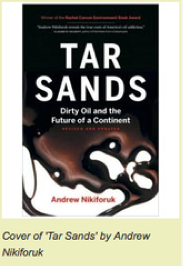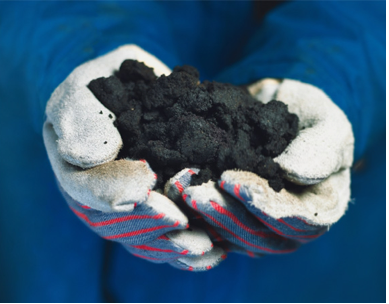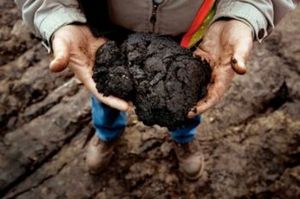Andrew Nikiforuk's "Tar Sands: Dirty Oil and the Future of a Continent" 
Canada is on the verge of becoming a global supplier of bitumen production. As the petroleum issue grows into a worldwide matter of emergency, Andrew Nikiforuk is using his writing a platform for awareness. Now, every Canadian must ask themselves: Am I ready to give up my country for the development of something that works to destroy our economy and environment?
"Tar Sands: Dirty Oil and the Future of a Continent" by Andrew Nikiforuk is a bold declaration of facts, figures, and opinions concerning the immense exploitation of Alberta's bituminous sands. As a result of greed and negligence from political leaders and capitalists, the author states his passionate proclamation for action against the economic and environmental destruction of Canada's Great Reserve. Nikiforuk successfully pleads a case for his purpose as he exposes the reality of petroleum issues, and encourages readers to react to the immense destruction taking place in Alberta.
The material covered in Nikiforuk's book demonstrates a personal undertone of concern while outlining a factual account of the state of destruction in Alberta at present time, as a result of gradual exploitation. Nikiforuk begins by taking the reader through a series of tremendous facts about petroleum and the tar sands in correlation to economic and environmental devastation. With points on bitumen production overtaking water and energy consumption, social damage amongst Albertans, capital investment in expansion of the mines, and moral carelessness from political leaders, Nikiforuk divulges a palate of thought provoking cases. One point after another, Nikiforuk's message in four little words remains constant, and is the undertone to the very purpose of the book: "We must begin today" (5); a powerful declaration for action against the damage being done in one of Canada's coveted provinces.
But, just who is Andrew Nikiforuk? And why does his voice matter?
 Well, Nikiforuk is a Canadian. He also lives in Alberta. His opinion of what is happening to his land, per se, makes his voice on the subject, one that is of importance. When the land of which you live on is perpetuated by government takeover, namely to extract gas or produce bitumen, you as a human being, as a Canadian, have the right to stand up for that land and have yourself heard. Nikiforuk has done exactly that for the last two decades. Aside from Tar Sands, Nikiforuk has written several books and published a number of articles in magazines such as Maclean's and Canadian Business. More importantly, Nikiforuk has put forth, through this book, his contribution to a nationwide debate over who controls our land and how it is being used. Andrew Nikiforuk is not only urging action, but he is doing his part to spread awareness by having written Tar Sands.
Well, Nikiforuk is a Canadian. He also lives in Alberta. His opinion of what is happening to his land, per se, makes his voice on the subject, one that is of importance. When the land of which you live on is perpetuated by government takeover, namely to extract gas or produce bitumen, you as a human being, as a Canadian, have the right to stand up for that land and have yourself heard. Nikiforuk has done exactly that for the last two decades. Aside from Tar Sands, Nikiforuk has written several books and published a number of articles in magazines such as Maclean's and Canadian Business. More importantly, Nikiforuk has put forth, through this book, his contribution to a nationwide debate over who controls our land and how it is being used. Andrew Nikiforuk is not only urging action, but he is doing his part to spread awareness by having written Tar Sands.
Several of the outstanding points made in the book revolve around the social destruction caused by the pit mining and bitumen production in Alberta. The issue is so pressing, Nikiforuk dedicates an entire chapter on the matter: "Highway to Hell". He explains how the transport route in Fort McMurray has become so outrageously dangerous due to road conditions and the ample amount of trucks going to and from the pit mines; increasing the number of deaths and accidents that occur each year. The highway itself has been nicknamed by locals as "Suicide 63". Not only are roads and trucks of concern, but drug use and trafficking has also now come to the forefront of problems. Furthermore, social problems have become so prominent that healthcare in the Fort McMurray area has dwindled in access. In fact, Nikiforuk states that doctors were enticed with thousands of dollars a day to go out and make special visits to the dangerous tar sands spot. Though the working conditions of the pit mines are so volatile, workers continue to be drawn into the project because of high wages.
Nikiforuk makes it a point to provide evidence of such as he quotes ex-workers and their sentiments. One ex-worker quoted remark is highly significant of the vicious cycle that has taken over Alberta tar sands project: "...greed is more important than your own personal health" (51). While political leaders continue to over exploit the land for capital gain without concern of the health risks to laborers, workers sacrifice their well-being for sky high pay wages. Nikiforuk states information on the matter of social destruction while providing personal testimonies from those who have directly worked in Alberta which encourages readers to react to the intensity of the issue at hand.
Nikiforuk has not solely relied on outsider testimonies; in fact, he divulges his own personal experience from living in Calgary, Alberta. Nikiforuk shares how his property tax have rocketed since the pit mining has increased, how day in and day out he sees Calgary has become a wasteland of fortune seekers and addicts, and how he is one of 400, 000 Calgarians who is without a family physician. This powerful, first person testimony comes after a lengthy account of facts, figures, and outsider reports on the affect the tar sands production has had on the province. Nikiforuk's personal story is a way for other Canadians to relate or at the very least react to the experience of someone who is living proof that any one of us could find ourselves greatly affected by this issue.
Like the author, filmmaker Josh Fox, decided to use his personal story in order to relate a bigger message concerning the effect natural gas drilling has had on a multitude of Americans. When Fox was asked by a natural gas company to lease his land for a hefty sum, he decided to venture out to other cities and states in order to see for himself what the drilling on his land might require. Fox documented the communities affected by the hydraulic fracturing, and found countless Americans were left with contaminated water, dying livestock, and illness. Where Nikiforuk used text in the form of facts and figures to bring light to the issue, Fox used film and offered a visual for the petroleum issue causing social catastrophes. In addition, both Nikiforuk and Fox have used their personal accounts to fuel a reaction on an on-going problem facing not only North America, but the world. Alberta is becoming a dependant oil resource to international markets; while in Wyoming a guy can light his water on fire. How long till your water can light on fire? I don't ever want to experience that, and that is precisely what both Nikiforuk and Fox ask its audience to consider.
Tar Sands is an aggressive account of information and testimony on the dirty oil issue in Canada. Though Nikiforuk states the present issue is so out of hand, he does remind his readers that change is possible. Canada belongs to us, and we have the power to make the necessary changes. Nikiforuk puts forth a strong argument that accelerates his core message for change: "Bitumen development will never be sustainable" (4). Andrew Nikiforuk successfully serves his passionate plea for change by asserting the fact that Alberta is in dire need of management and is at an all time high risk of jeopardizing the state of the province and the country economically, environmentally, and socially.
Works Cited:
Nikiforuk, Andrew. Tar Sands: Dirty Oil and the Future of a Continent. Vancouver: Greystone Books, 2010. Print.
Gasland. Dir. Josh Fox. Perf. Josh Fox, Dick Cheney. Docurama. 2010. DVD.
Image courtesy of: bcsea.org


Leave a comment